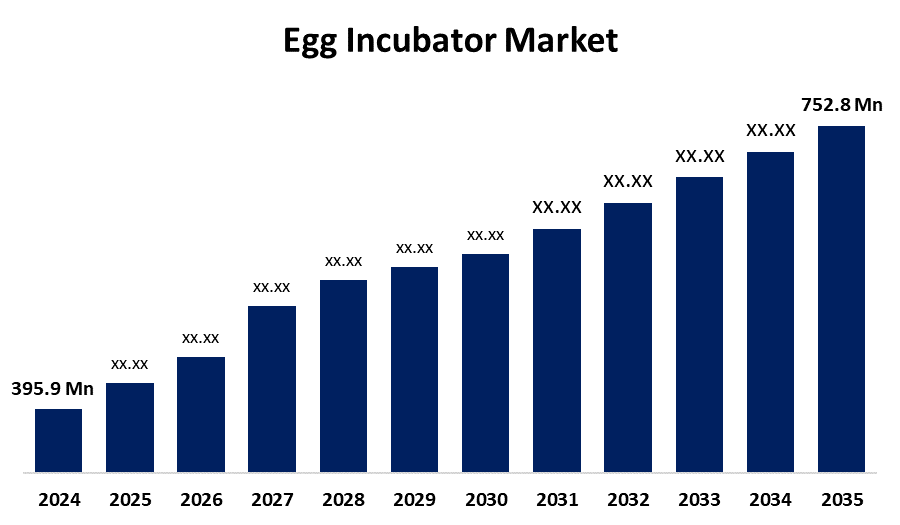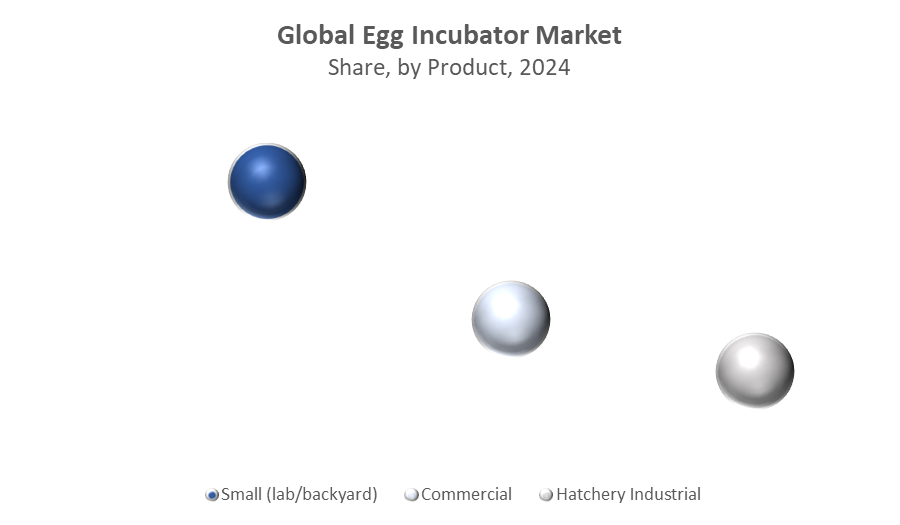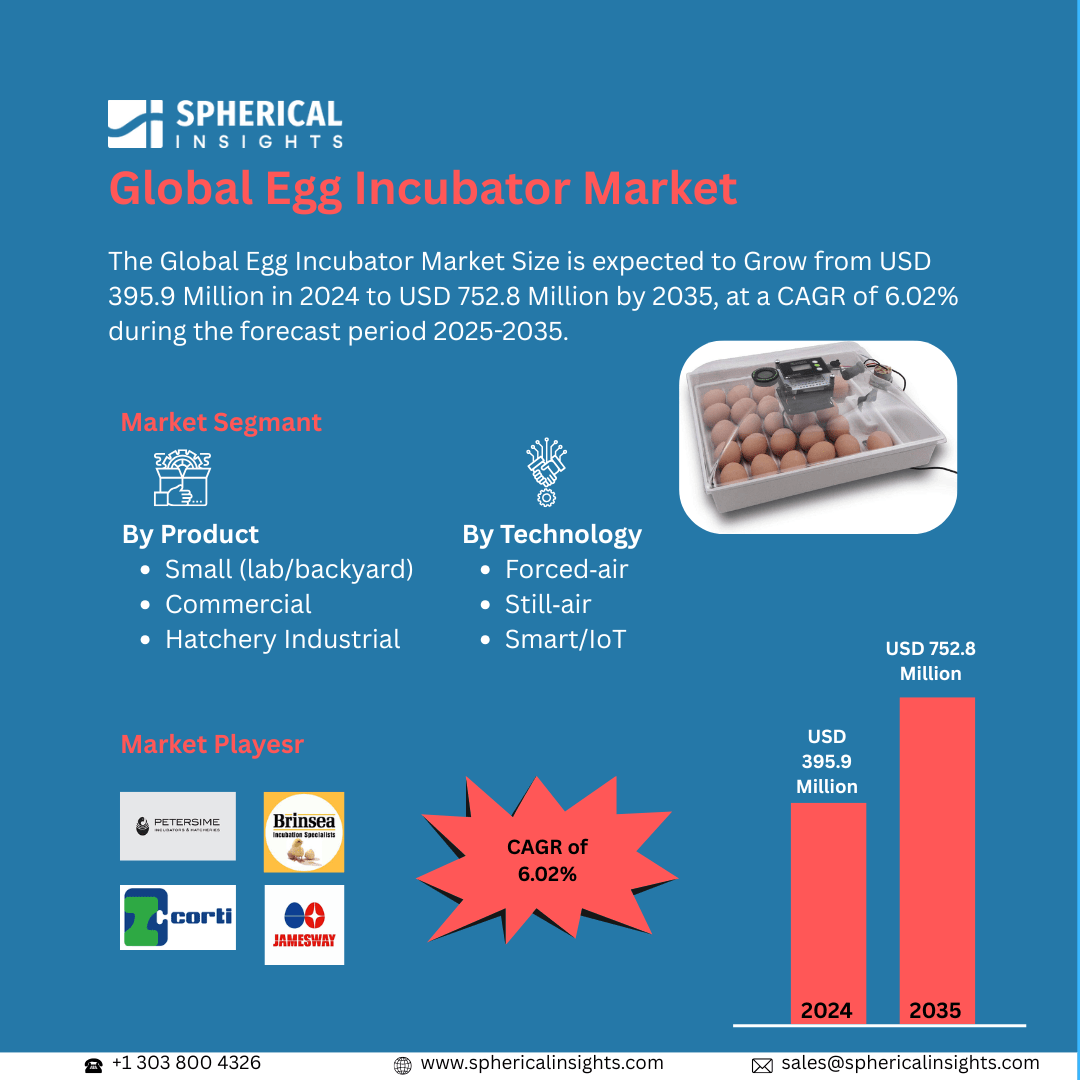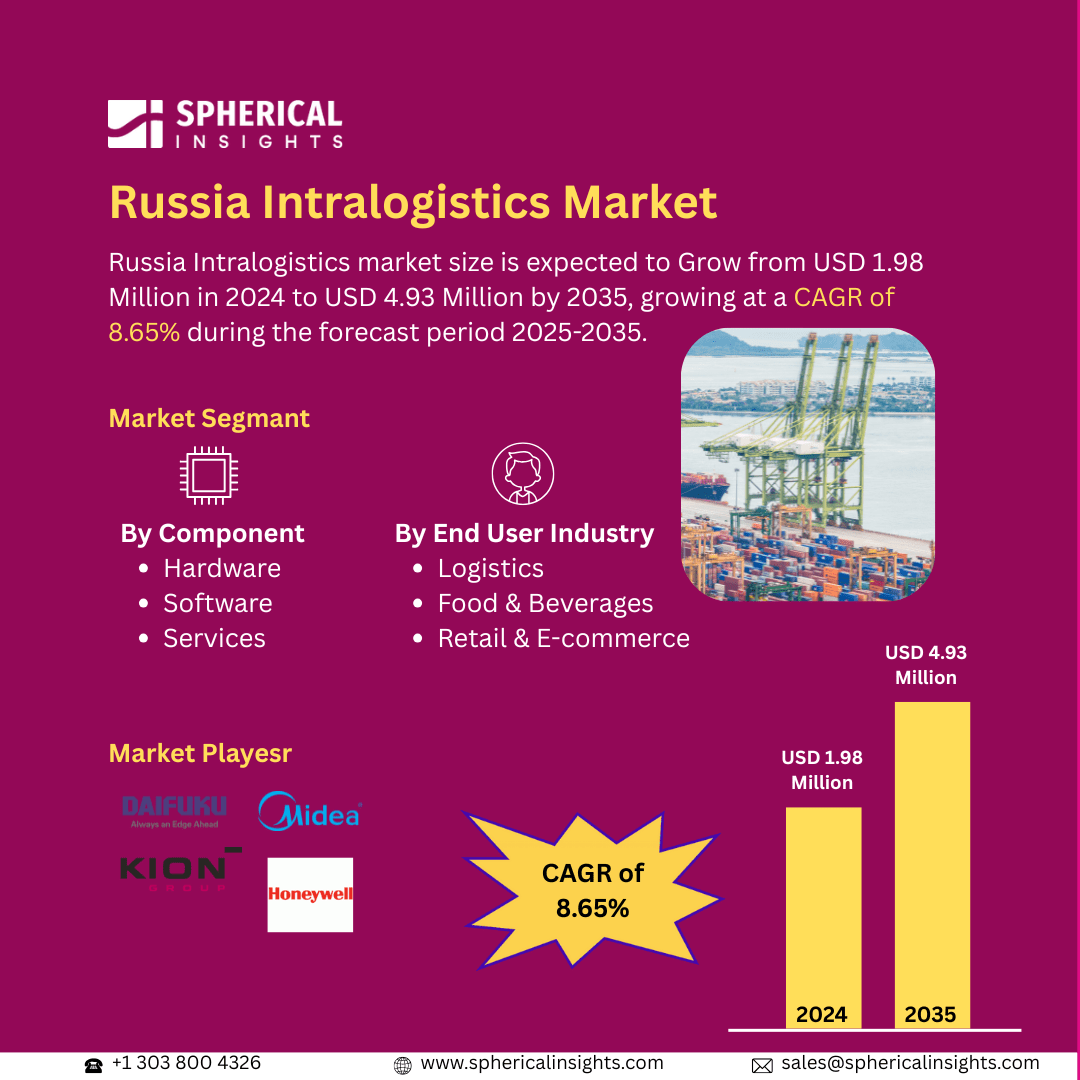Egg Incubator Market Summary, Size & Emerging Trends
According to Spherical Insights, the Global Egg Incubator Market Size is expected to grow from USD 395.9 million in 2024 to USD 752.8 million by 2035, at a CAGR of 6.02% during the forecast period 2025–2035. Emerging trends include the greater adoption of smart/IoT-enabled incubators, the growth of commercial hatcheries, and increasing demand from poultry producers in emerging markets.
Key Market Insights
- Asia Pacific is expected to account for the largest share in the egg incubator market in the forecast period, driven by rapid growth in poultry farming in countries like China and India..
- By product segment, small/backyard incubators are gaining traction in rural/household poultry operations, while hatchery industrial units dominate commercial applications.
Global Market Forecast and Revenue Outlook
- 2024 Market Size: USD 395.9 Million
- 2035 Projected Market Size: USD 752.8 Million
- CAGR (2025-2035): 6.02%
- Asia Pacific: Largest market in 2024
- North America: Fastest growing market

Egg Incubator Market
The egg incubator market focuses on devices that enable artificial incubation of eggs in poultry farms, hatcheries, and research facilities. These incubators regulate temperature, humidity, and ventilation to ensure optimal hatchability and healthy chick development. Rising global demand for eggs and poultry products, particularly in emerging economies, is driving market growth. Technological advancements, including automated systems, digital monitoring, and IoT-enabled smart incubators, are improving operational efficiency and productivity. Additionally, increased emphasis on biosecurity, sustainable farming practices, and regulatory compliance further fuels adoption. As poultry farming modernizes, egg incubators are becoming essential tools for enhancing yield, ensuring consistent quality, and supporting large-scale operations. The market continues to expand as producers seek reliable, efficient, and technologically advanced incubation solutions to meet growing food supply demands worldwide.
Egg Incubator Market Trends
- Growing push towards smart/IoT enabled incubators with features such as remote monitoring, data analytics, and automated control.
- Increase in commercial hatcheries and large scale poultry farms driving demand for industrial scale incubators.
- Rising interest in small/backyard poultry operations, particularly in developing markets, fuelling demand for compact incubator units.
- Manufacturers focusing on enhancing hatchability, reducing energy consumption, and improving user interface and controls.
Egg Incubator Market Dynamics
Driving Factors: Rising demand for poultry meat and eggs worldwide
Key growth factors for the egg incubator market include increasing global consumption of poultry meat and eggs, which drives the need for efficient and reliable incubation systems. Technological advancements such as automation, IoT-enabled monitoring, and improved materials enhance hatchability, reduce labor, and boost operational efficiency. Additionally, growing infrastructure and investment in poultry farming, particularly in emerging economies, support market expansion. Government initiatives promoting modern farming practices and biosecurity measures further stimulate adoption, ensuring consistent quality and productivity in poultry operations worldwide.
Restrain Factors: High capital and operational requirements may limit adoption
Restraining factors in the egg incubator market include the high cost of industrial and automated incubators, which can restrict their adoption among small-scale or backyard farms. Maintaining precise temperature, humidity, and ventilation can be challenging, particularly in regions with unstable electricity or environmental conditions. The continued availability of older, manual, or less-advanced models may slow replacement or upgrade cycles. These factors combined can restrict market growth, making it essential for manufacturers to develop cost-effective, user-friendly solutions.
Opportunity: Expansion of smart and small-scale incubator solutions
The egg incubator market presents several promising opportunities. Growth in backyard and small-scale poultry farming opens a segment for low-cost, compact incubators. Smart and IoT-enabled incubators provide remote monitoring, predictive maintenance, and value-added services, enhancing operational efficiency. Developing regions represent significant growth potential as modern incubation solutions gain adoption. Additionally, rising awareness of biosecurity and sustainability creates opportunities for technologically advanced incubators to meet evolving industry requirements.
Challenges: Supply chain disruptions and technical reliability
Challenges in the egg incubator market include fluctuations in raw material costs, supply chain disruptions, and potential impacts from tariffs or trade restrictions, affecting manufacturing and pricing. Ensuring consistent hatchability and reliable performance under varying operational conditions, especially for small-scale or low-cost units, remains a technical challenge. Manufacturers must continuously innovate and enhance product durability and environmental control systems to address these challenges and maintain market competitiveness.
Global Egg Incubator Market Ecosystem Analysis
The egg incubator market ecosystem comprises manufacturers offering a range of products by size, capacity, and technology, raw material suppliers, poultry hatcheries and farms as end-users, and service or maintenance providers, particularly for smart and IoT-enabled devices. Market growth relies on the integration of technological innovation, cost-efficient production, and adherence to regulatory standards. Effective distribution channels to global poultry farms are critical, while ongoing support and maintenance for advanced incubators enhance reliability, hatchability, and operational efficiency, driving broader adoption across commercial and small-scale poultry operations.
Global Egg Incubator Market, By Product
The small (lab/backyard) segment includes low-capacity incubators designed for hobbyists, research laboratories, and small-scale poultry keepers. These compact units provide basic temperature and humidity control suitable for limited egg volumes. They account for approximately 35% of the global egg incubator market, driven by growing interest in backyard farming, small poultry operations, and educational/research purposes. The segment benefits from affordability, ease of use, and accessibility, making it ideal for users seeking low-cost and simple incubation solutions.

The commercial segment covers mid-capacity incubators used by small commercial poultry farms and local hatcheries. These units support higher egg volumes with improved temperature, humidity, and ventilation control, enhancing hatchability and operational efficiency. This segment represents about 45% of the market share, fueled by the expansion of local poultry production and small-scale hatchery operations in emerging and developed regions. It is characterized by higher initial investment but offers greater productivity and reliability compared to small units.
Global Egg Incubator Market, By Technology
Forced-air incubators employ fans to circulate air continuously, maintaining uniform temperature and humidity throughout the chamber. This consistent environment optimises hatchability, reduces chick mortality, and supports larger egg volumes, making it ideal for commercial hatcheries and medium-to-large poultry farms. The segment accounts for approximately 50% of the global egg incubator market due to its efficiency, precision, and scalability. Technological advancements, including automated controls, digital monitoring, and IoT integration, further enhance productivity and reduce labour requirements, driving adoption in both emerging and developed regions.
Still-air incubators operate on natural convection, with air remaining largely stationary inside the chamber. Temperature tends to vary between the top and bottom levels, so users must manually rotate eggs for uniform incubation. This technology is widely used in small-scale or backyard setups, research labs, and hobbyist applications due to its low cost, simplicity, and minimal maintenance. Representing about 30% of the market, still-air incubators appeal to those needing compact, affordable solutions for limited egg volumes, though they are less efficient for large-scale production.
North American egg incubator market is driven by the demand for high-quality poultry products, advanced farming practices, and technological adoption. Commercial farms and hatcheries increasingly use forced-air and smart/IoT incubators to improve efficiency and hatchability. The region also benefits from stable electricity supply, strong infrastructure, and regulatory support for biosecurity and animal welfare. North America accounts for a significant market share, with growth fueled by the U.S. and Canada’s focus on automation and precision farming in both commercial and small-scale poultry operations.
Europe’s egg incubator market is characterised by advanced poultry farming practices, regulatory compliance, and sustainability initiatives. The demand for organic and high-quality poultry products encourages the adoption of automated and energy-efficient incubators. Countries like Germany, France, and the UK are leading in the use of smart incubators integrated with IoT and monitoring systems. European growth is moderate but steady, with innovation, regulatory standards, and consumer demand for sustainable practices driving market expansion.
Asia Pacific is the fastest-growing regional market for egg incubators, driven by increasing poultry consumption, rapid urbanisation, and government support for agriculture and livestock development. Countries such as China, India, and Southeast Asian nations are witnessing significant investments in commercial hatcheries and small-scale farms. Rising adoption of automated and forced-air incubators, along with smart technology integration, enhances hatchability and efficiency. Asia Pacific represents the largest revenue share globally, supported by the expanding poultry industry, technological adoption, and a growing focus on food security and sustainable farming practices.
WORLDWIDE TOP KEY PLAYERS IN THE EGG INCUBATOR MARKET INCLUDE
- Petersime NV
- Brinsea Products Ltd.
- GQF Manufacturing Company Inc.
- Corti Zootecnici Srl
- Rcom Incubators (Autoelex Co., Ltd.)
- Jamesway Incubator Company
- Surehatch Egg Incubators
- Heka Incubators
- Borotto SRL
Market Segment
This study forecasts revenue at global, regional, and country levels from 2020 to 2035. Decision Advisor has segmented the Egg Incubator Market based on the following categories:
Global Egg Incubator Market, By Product
• Small (Lab/Backyard)
• Commercial
• Hatchery Industrial
Global Egg Incubator Market, By Technology
• Forced-Air
• Still-Air
• Smart/IoT
Global Egg Incubator Market, By Regional Analysis
- North America
- Europe
- Germany
- UK
- France
- Italy
- Spain
- Russia
- Rest of Europe
- Asia Pacific
- China
- Japan
- India
- South Korea
- Australia
- Rest of Asia Pacific
- South America
- Brazil
- Argentina
- Rest of South America
- Middle East & Africa
- UAE
- Saudi Arabia
- Qatar
- South Africa
- Rest of the Middle East & Africa





